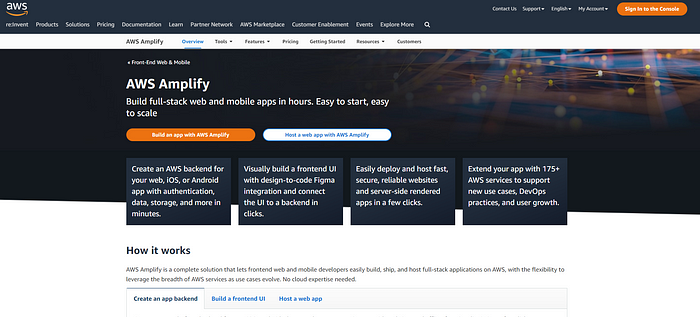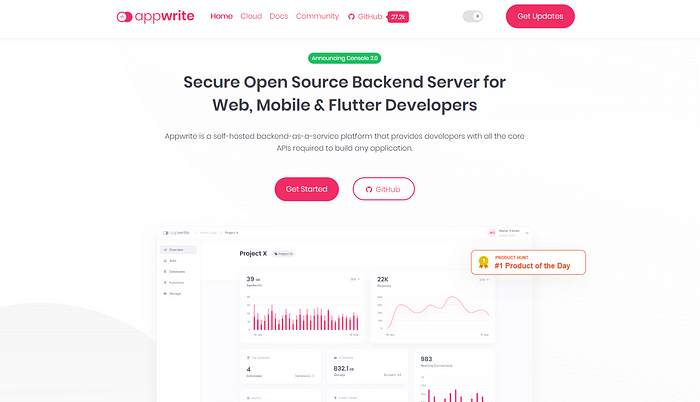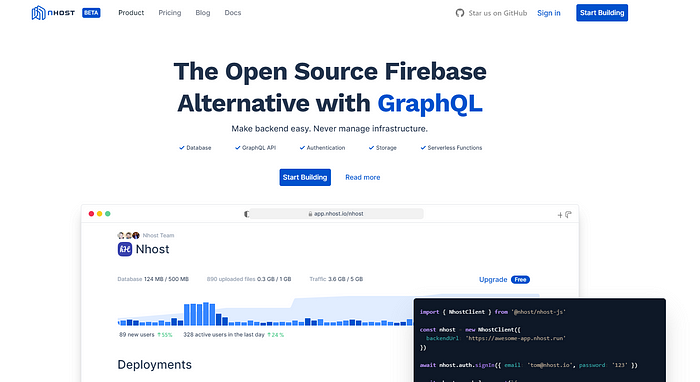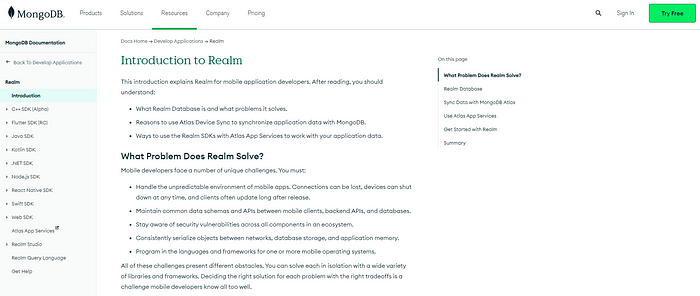Firebase is Overrated. 5 Alternatives that are currently killing it.

Firebase has been a dominant player in the world of mobile and web app development, but some developers are starting to question whether it’s really all it’s cracked up to be.
If you’re one of them, you’re in luck!
I’ve scoured the landscape of app development platforms and uncovered a host of alternatives that are giving Firebase a run for its money. These platforms offer a range of tools and services that may be better suited to your needs and the unique requirements of your project. Get ready to discover the hidden gems of the app development world and take your projects to the next level.
But first, what is Firebase?

What is Firebase?
Firebase is a mobile and web application development platform that provides a range of tools and services for developers. It offers services for aspects of app development, such as user authentication, data storage, and cloud-based computing.
Firebase also provides a proprietary technology stack, which allows for tight integration between different services and makes it easy for developers to build and deploy their applications. Additionally, Firebase has a large community and support ecosystem, providing resources and assistance for developers who are using the platform. Overall, Firebase aims to make it simple and straightforward for developers to build and deploy high-quality mobile and web applications.
Pros of Firebase:
- Large community and support ecosystem
- Comprehensive set of tools and services for app development
- Proprietary technology stack, allowing for tight integration between different services
Cons of Firebase:
- Proprietary technology stack, which may be limiting for developers who prefer to use open-source technology or a different stack
- May not have as many advanced features and customization options as some other platforms
- May require a learning curve to become familiar with Firebase’s technology and ecosystem.
What are the alternatives to Firebase?
Here is a quick list of 5 alternatives to Firebase, including their pros and cons.
1. Supabase

Supabase is an open-source platform for building and deploying real-time web applications. It offers a range of tools and services that are similar to those provided by Firebase, including a database, authentication, and hosting.
However, Supabase differentiates itself from Firebase by being built on top of PostgreSQL, an open-source relational database management system, and by providing a REST API and GraphQL API for accessing data stored in the database. This allows developers to build applications using their preferred language and framework, rather than being tied to Firebase’s proprietary technology stack.
Additionally, Supabase is focused on providing a seamless developer experience and making it easy to build and deploy real-time applications, which some developers may find appealing compared to Firebase.
Pros of Supabase:
- Open-source technology stack, allowing developers to use their preferred languages and frameworks
- REST and GraphQL APIs for accessing data stored in the database
- Seamless developer experience and easy to build and deploy realtime applications
Cons of Supabase:
- May not have as many built-in features and tools as Firebase
- May require a deeper understanding of PostgreSQL and the underlying technology stack
- May not have as large of a community and support ecosystem as Firebase
2. Amplify

Amplify is a suite of tools and services for building and deploying cloud-powered web and mobile applications. It is offered by Amazon Web Services (AWS) and aims to provide a complete end-to-end solution for developers, from front-end user interfaces to back-end cloud infrastructure. Amplify provides services for various aspects of app development, including user authentication, data storage, and cloud-based computing.
It also offers a range of integrations with other AWS services, allowing developers to easily incorporate machine learning, analytics, and other advanced features into their applications. This makes Amplify an appealing option for developers who are already familiar with and invested in the AWS ecosystem.
Compared to Firebase, Amplify offers a more comprehensive set of tools and services, but may require a steeper learning curve and a deeper investment in the AWS ecosystem.
Pros of Amplify:
- Comprehensive set of tools and services for app development
- Tight integration with other AWS services, allowing for advanced features such as machine learning and analytics
- Suitable for developers who are already familiar with and invested in the AWS ecosystem
Cons of Amplify:
- May require a steeper learning curve and a deeper investment in the AWS ecosystem
- May not have as many built-in features and tools as Firebase
- May not have as large of a community and support ecosystem as Firebase
3. Apprite

Apprite is a cloud-based platform for building and deploying web and mobile applications. It offers a range of tools and services, including a realtime database, user authentication, and cloud hosting. One of the key differentiators of Apprite is its focus on providing an intuitive visual interface for building and managing applications, which may appeal to developers who prefer a more graphical approach to app development.
Additionally, Apprite offers a range of pre-built modules and integrations that can be easily incorporated into applications, allowing developers to quickly add common features such as messaging, notifications, and analytics.
Compared to Firebase, Apprite offers a more user-friendly interface and a larger selection of pre-built components, but may lack some of the more advanced features and customization options offered by Firebase.
Pros of Apprite:
- Intuitive visual interface for building and managing applications
- Large selection of pre-built modules and integrations
- User-friendly interface and easy to use for developers with little or no experience
Cons of Apprite:
- May not have as many advanced features and customization options as Firebase
- May not have as large of a community and support ecosystem as Firebase
- May be limited in terms of the languages and frameworks supported
4. NHost

NHost is a cloud-based platform for building and deploying serverless web and mobile applications. It offers a range of tools and services, including a managed database, user authentication, and serverless functions. One of the key differentiators of NHost is its focus on providing a serverless development experience, which allows developers to build and deploy applications without the overhead of managing servers. This can make the development process faster and more agile, and can also reduce costs by only charging for the resources used by the application.
NHost also offers a range of integrations with other cloud services, such as Stripe for payment processing and Sentry for error tracking, which can make it easier for developers to add advanced features to their applications.
Compared to Firebase, NHost offers a more serverless-oriented development experience and a broader range of integrations with other cloud services, but may not have as many features and options for customizing the underlying infrastructure.
Pros of NHost:
- Serverless development experience, allowing for faster and more agile development
- Cost-effective, only charging for the resources used by the application
- Range of integrations with other cloud services, such as Stripe and Sentry
Cons of NHost:
- May not have as many built-in features and tools as Firebase
- May require a deeper understanding of serverless architecture and cloud-native development
- May not have as large of a community and support ecosystem as Firebase
5. MongoDB Realm

MongoDB Realm is a mobile and web application development platform that is built on top of the popular MongoDB database. It offers a range of tools and services for building and deploying applications, including a real-time database, user authentication, and cloud functions.
One of the key differentiators of MongoDB Realm is its tight integration with the MongoDB database, which allows developers to easily store and access data using the MongoDB query language and data model. This can be particularly appealing for developers who are already familiar with MongoDB and want to leverage its features in their applications.
MongoDB Realm also offers a range of integrations with other services, such as AWS Lambda and Google Cloud Functions, which can make it easier to add advanced features to applications. Compared to Firebase, MongoDB Realm offers a more seamless integration with the MongoDB database and a broader range of integrations with other services, but may not have as many built-in features and tools as Firebase.
Pros of MongoDB Realm:
- Seamless integration with the MongoDB database, allowing developers to use the MongoDB query language and data model
- Range of integrations with other services, such as AWS Lambda and Google Cloud Functions
- Suitable for developers who are already familiar with MongoDB
Cons of MongoDB Realm:
- May not have as many built-in features and tools as Firebase
- May require a deeper understanding of the MongoDB database and its features
- May not have as large of a community and support ecosystem as Firebase
Final thoughts
While Firebase has long been a popular choice among mobile and web app developers, it is not the only option available. There are a number of alternative platforms that offer similar tools and services and may be better suited to the specific needs of certain developers and projects.
Supabase, Amplify, Apprite, NHost, and MongoDB Realm are just a few examples of platforms that are currently “killing it” in the world of app development.



Comments ()